A guest blog by Beacon School Quality Mark Lead Teacher, Sam Hunt MBE, Sandhurst School.
Rwanda, a nation of so many tears, a nation of such sorrow. A nation rebuilding itself after genocide and forging a new future where mass murder based on ethnic hatred will never be repeated.
Thirty years after the horrific genocide and war that thrust Rwanda before the world’s eyes in 1994, the people are slowly emerging from the most traumatic period of their history. In a hundred days of mass murder, orchestrated by the Hutu government as a political strategy to preserve its hold on power, whole communities of the Tutsi ethnic group were wiped out, and many moderate Hutus were also murdered. To compound the horror, the world at large turned its back on Rwanda while the massacres continued. Consequently, one million were slaughtered.
Since those dark days, tremendous efforts have been made by the current government to tackle the complex problems facing Rwanda, with much success. However, the legacy of death and destruction has left a generation of survivors who have been traumatised by their experiences during the genocide. The survivors cheated death, but they tasted it and have since paid a heavy price for surviving. They know what it is to suffer; they know what it means to lose loved ones, relatives and property. In addition to having to cope with the lasting consequences of bereavement, trauma and poverty, between 250,000 and 500,000 women were raped during the 100 days of genocide. Around 70% were infected with HIV, a result of a systematic and planned use of rape by HIV+ men as a weapon of genocide. Up to 20,000 children were born as a result.
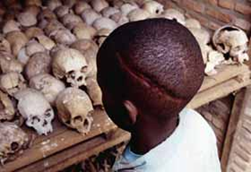
The cruel ideology of genocide did not spare children. It is estimated that about one third of those murdered were children. No words can describe the suffering of those who died or the pain of those who survived, traumatised for life. Those children who survived were pulled barely alive from heaps of corpses, or found wandering alone, aimlessly and helplessly through the deserted streets. UNICEF estimates 95,000 children were left orphaned because of the genocide and over one third of the children witnessed the deaths of their families.
“If you had really known yourself and you had really known me, then you would not have killed me.”
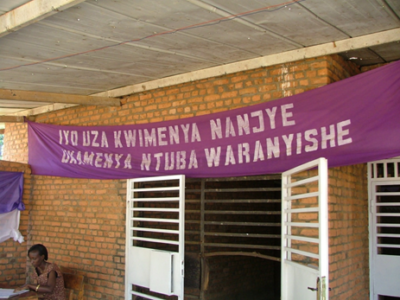
When I first visited Rwanda in 2006, I noticed this message written over many of the sites of mass murder. This is a message to those who perpetrated the genocide. However, during my first visit to this country twelve years later, I came to realise that it is also a message to me and to all of us who sat by in our comfortable houses in 1994, shrugging our shoulders when we saw the horrors replayed on the News and thinking to ourselves “Not another disaster in Africa! Well, there’s nothing that I can do about it.” I feel ashamed that I was one of those people. As Edmund Burke once said :
“All that is needed for the forces of evil to triumph, is for enough good men to do nothing”
Meeting the survivors of the Genocide Against the Tutsi has been a life-changing experience for me and the time I have spent in this amazing country has filled me with hope, rather than despair. The dreadful, grinding poverty suffered by the survivors is plain for all to see. Despite the fact that many survivors have no choice but to still live amongst those who slaughtered their loved ones, the survivors I have the privilege of working with are not wallowing in a pit of despair and self-pity. They have a profound determination to work and strive for a better future for themselves and for the nation as a whole, a deep commitment to ensuring that the mantra of “Never Again” actually becomes a reality in Rwanda, rather than just a dream!
Inspired by our Quality Mark in Holocaust Education and the outstanding pedagogy and values we have learned through our long association with the Centre for Holocaust Education at the IOE, my school, Sandhurst School in Bracknell Forest, has been determined to motivate and empower our students to actively strive for a world where genocide is a thing of the past, and to support survivors to rebuild their lives and trust in humanity.
Partnering with an absolutely amazing charity, Survivors Fund (SURF), my school has launched the “Reaching Rwanda” project which has 2 main aims :
- To enable young people in the UK to develop personal relationships with survivors of the Genocide against the Tutsi in Rwanda and their children.
- To provide UK students with the opportunity to become actively involved in taking action to change lives and leave a lasting benefit for people in Rwanda.
The main focus of this project is not charity fundraising. It is about enabling young people in the UK and Rwanda to forge meaningful, long-lasting friendships, facilitated through SURF, the power of Zoom and the regular exchange of gifts and letters!
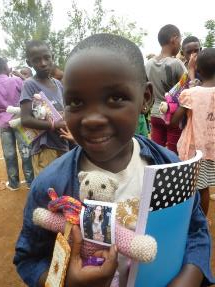
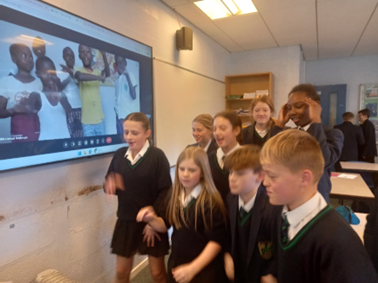
However, as a result of these friendships, many of my students have been motivated to raise money to support their Rwandan friends. As a result, they have collectively raised almost £300,000!!
Through the guidance and support of SURF we have used this money to create a long-term legacy in Rwanda :
- We have rebuilt the survivors’ village in Ntarama, renovating and providing furnished housing for over 60 genocide survivors and their children.
- We have now started the refurbishment of a second survivor village in Kamonyi.
- We have provided cows, goats and chickens and training in animal care and husbandry to 80+ orphan-headed households.
- We have set up over 40 businesses in Rwanda, providing a source of income for over 100 survivors of the genocide. Our businesses include sewing co-operatives, market stalls, a mobile-catering facility, 2 refreshment kiosks, a chicken farm, a garden centre, a hairdressing salon and a bridal-wear hire shop.
- We have sponsored 50+ survivors and their dependents to go to school, university or to have vocational training
- We paid for water pumps to be installed in 2 villages in Kamonyi
- We have provided tons of educational resources to 3 Rwandan schools and have installed a water facility to support 2,000 students in Musanze.
- We have given tons of educational resources, toys and toiletries to vulnerable children
- We are currently providing monthly payments to dozens of vulnerable families to pay for their accommodation, medical bills and food.
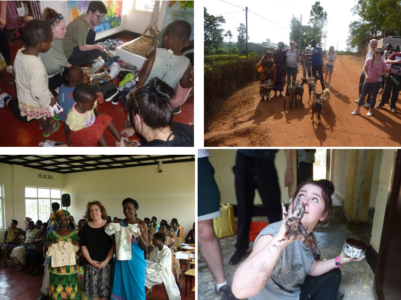
We have now taken our dedication to supporting people in Rwanda a step further by opening our own education centre in the Bugesera district. Our centre “Philly’s Place”, contains 4,000+ educational books and resources for the children to use, to support their studies in English, Kinyarwanda and Maths. The centre also provides the opportunity for the children of the district to do science, technology, art, drama, music, dance and sport. All of these services are provided free of charge and over 1,000 children are regularly attending our after-school programmes.
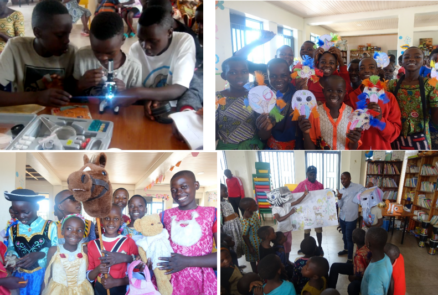
The Reaching Rwanda project has also been transformative for our students too, instilling in them a sense of agency, and the knowledge that, with effort and hard work, we can absolutely make a positive difference in the lives of others and in the world in general. One student, after participating in our annual visit to Rwanda wrote :
“Rwanda was the most unfathomably phenomenal experience I have had in my life. The things we witnessed, the things we did, and the people we met, were so incredible that I can’t use words to adequately describe it. It didn’t hit me, until soon after we arrived back, that we had changed so many individual lives, and affected so many people to the extent that we did; I can definitely say, without hesitation, we made an important difference to these people, and those people have made an enormous difference to us.”
If you are interested in teaching about this genocide or in even coming to Rwanda with us, please do not hesitate to contact me at shunt@sandhurstschool.org.uk
Sam Hunt MBE

